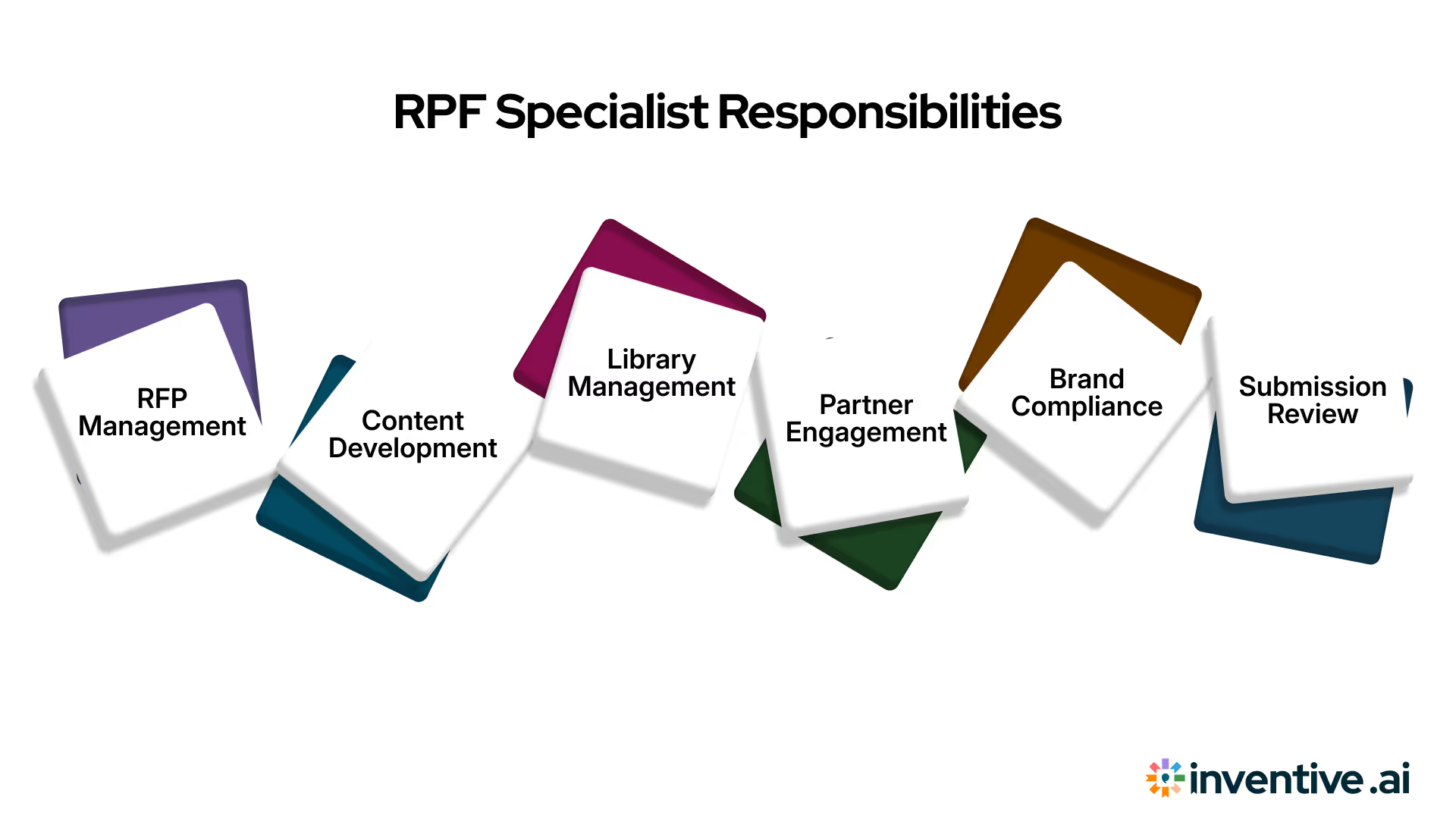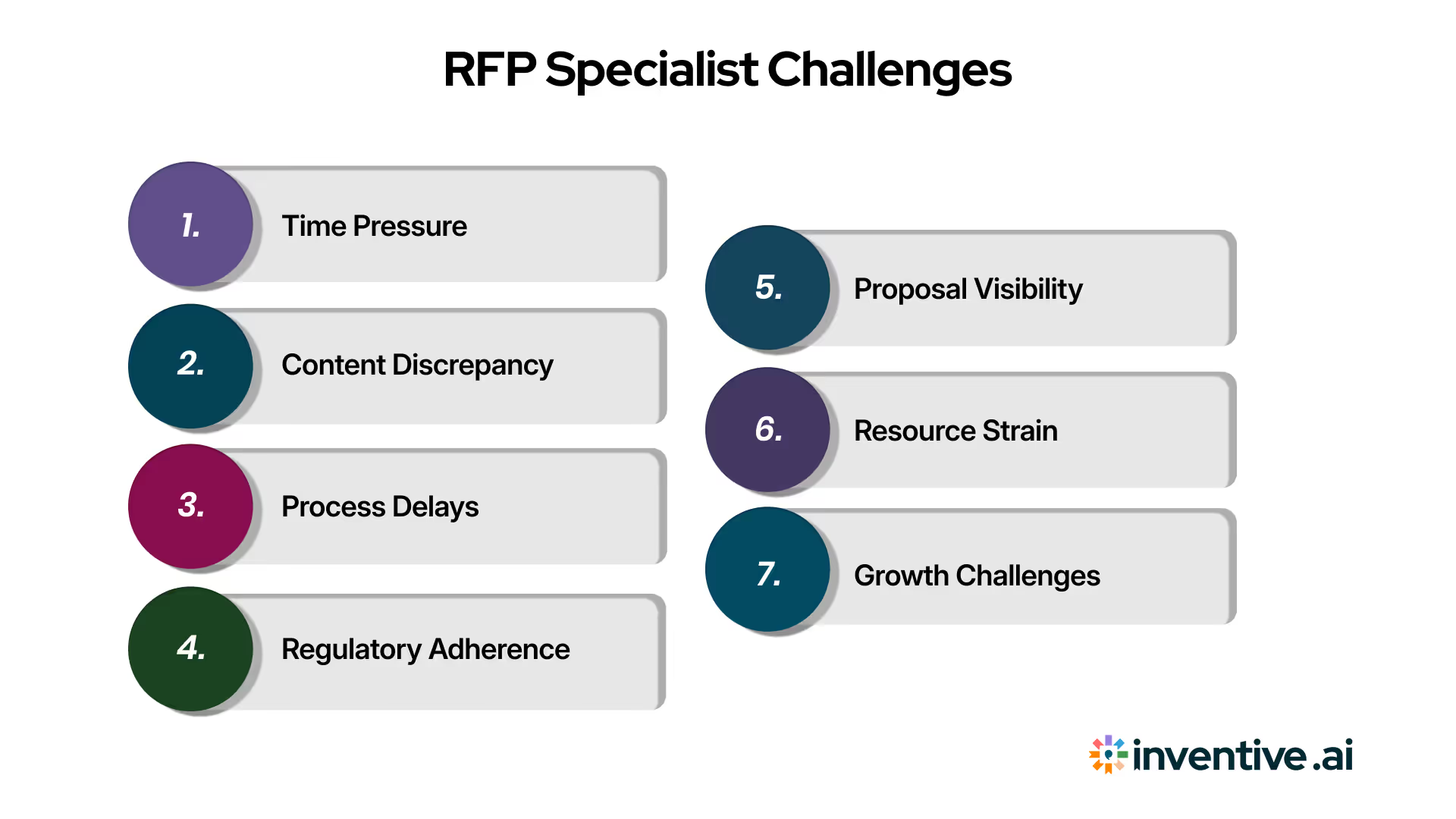Understanding the RFP Specialist Role and Its Salary Insights
RFP Specialist Role: Importance and Salary Insights

Introduction
Ever wonder who’s behind the scenes turning complex RFPs into high-value wins?
It’s not just sales or legal; it’s often the RFP Specialist quietly managing the entire process.
In today’s markets, where missing a proposal deadline can mean losing a million-dollar deal, the role of the RFP Specialist has never been more critical. These professionals are the unsung heroes of revenue teams, managing everything from content coordination to compliance, while ensuring proposals land with impact.
But this isn’t just a back-office role anymore. The modern RFP specialist is a strategic asset, one who understands storytelling, sales cycles, security frameworks, and now, even AI automation. As the demand for faster, smarter proposals grows, so does the demand (and compensation) for skilled RFP talent.
In this blog, we’ll unpack who RFP specialists really are, what they do, why their role is indispensable in the proposal lifecycle, and how much they typically earn in the U.S. and beyond. Whether you're hiring for the role or considering stepping into it, this guide will give you the full picture.
Who is an RFP Specialist?
An RFP Specialist is a professional responsible for managing, coordinating, and producing high-quality responses to Requests for Proposals (RFPs), Requests for Information (RFIs), security questionnaires, and other client-requested documentation during the sales process. They serve as the central point of contact for proposal submissions, acting as both project managers and content strategists.
Their role involves more than just compiling documents. A strong RFP Specialist understands how to align the organization’s products or services with the client’s needs, often tailoring technical, legal, and business content to win competitive bids. They work closely with sales, product, legal, IT, and compliance teams to ensure proposals are accurate, persuasive, and submitted on time.
Depending on the organization’s size, an RFP Specialist might also be called a Proposal Manager, Bid Manager, or Response Manager, especially in industries like SaaS, healthcare, finance, and government contracting where the proposal process is complex and highly regulated.
If you’re considering enhancing your team’s proposal success, understanding these roles is essential. Let’s look into how RFP specialists can truly impact your win rates and overall business performance.
Average Salary by Country/Region
RFP Specialists (often listed as RPFs in job listings) are no longer viewed as simple support roles. They are strategic contributors who influence revenue, accelerate deal velocity, and improve win rates. As a result, compensation for RFP professionals has steadily increased, reflecting their growing importance in high-stakes proposal management.
United States: A High-Earning Market for RFP Specialists
As of June 2025, the average salary for an RFP Specialist in the U.S. is $165,714 annually, with top-tier professionals earning close to $200,000. According to ZipRecruiter:
- Median hourly wage: $79.67
- Top 10% earners: $199,500+
- Salary range: $132,500 – $204,500
Top U.S. Cities with Highest Salaries for RFP Professionals
These high-paying hubs often combine strong demand in SaaS, defense, and healthcare sectors with an elevated cost of living, making relocation decisions a balance between compensation and expenses.
These benchmarks reveal how geography, seniority, and industry specialization shape compensation for RFP professionals. Whether you’re evaluating your next job offer or building a proposal team, understanding salary trends helps guide smart decisions on hiring, retention, and long-term career growth.
Having gained insight into compensation trends, it's time to understand the challenges RFP specialists face in their day-to-day work. These hurdles are crucial in shaping the support and tools they need to succeed.
Why Are RFP Specialists Crucial for Sales Success?
In today’s competitive B2B environment, winning a deal often hinges on the quality and speed of your proposal. That’s where RFP Specialists become indispensable. They don’t just respond to requests; they drive outcomes that directly impact revenue, customer trust, and operational efficiency.
Here’s why their role is vital:
1. They Improve Win Rates With Tailored, On-Point Responses
Generic, boilerplate responses rarely win competitive deals. Customization is key, and RFP specialists excel here. They understand the buyer’s needs and tailor responses to address pain points, goals, and criteria. Instead of a "one-size-fits-all" approach, they craft proposals that resonate by aligning messaging with the client’s priorities. This approach significantly boosts win rates and positions the company as a relevant partner.
An RFP response that directly speaks to the client’s needs is crucial not only for winning but also for positioning your company as a trusted partner. This directly correlates to stronger customer relationships and higher conversion rates.
2. They Save Time for Sales and Subject Matter Experts (SMEs)
Time is precious for sales teams and SMEs, but without a dedicated RFP lead, account executives or engineers often get bogged down by drafting responses, gathering technical details, or reviewing compliance content. RFP specialists take on the bulk of the work, allowing your sales and SMEs to focus on client engagement and closing deals.
This leads to improved sales productivity. With RFP specialists handling time-intensive tasks, your revenue-generating team focuses on activities that directly affect the sales pipeline and growth. This efficiency speeds up the sales cycle and boosts team morale.
3. They Ensure Brand, Legal, and Compliance Consistency
Consistency in proposal content is crucial, especially in regulated industries. RFP specialists maintain a centralized repository of approved content, ensuring proposals meet the company’s brand guidelines and legal standards. This is critical in high-risk sectors where inconsistent or non-compliant proposals could result in costly errors or lost deals.
Having an RFP specialist ensures proposals are consistent with the company’s brand and comply with industry regulations. This reduces risk exposure, prevents mistakes, and avoids legal penalties.
4. They Keep the Proposal Process on Track
The RFP process involves numerous stakeholders across departments. With tight deadlines, proposals can easily stall. RFP specialists act as project managers, coordinating tasks, managing timelines, and ensuring that everything stays on track. Knowing that your proposal process is streamlined and deadlines are met eases operational concerns. RFP specialists ensure proposals are submitted on time, reducing bottlenecks and helping your company stay competitive.
5. They Turn Proposals Into Repeatable, Scalable Wins
RFP specialists don’t just execute individual proposals—they build scalable processes. By maintaining a content library of approved templates and past responses, they create a framework that allows future proposals to be completed more efficiently, transforming the process into a repeatable, strategic activity.
This scalability adds tremendous value. As the business grows and proposal volume increases, the process can scale through content reuse, automation, and standardized workflows, without needing to grow the RFP team.
If you're looking to improve the efficiency and effectiveness of your proposal process, consider how your RFP team could benefit from utilizing an AI RFP agent. Explore how Inventive AI's RFP agent can help streamline workflows and drive better results. Reach out to us to learn more.
To ensure your team is positioned for success, consider how RFP specialists can improve your processes and ultimately impact the bottom line. Take a closer look at the tools that can help empower them.
Core Responsibilities of an RPF Specialist

An RFP Specialist plays a pivotal role in managing the full lifecycle of proposal development. They ensure proposals are delivered on time, aligned with client expectations, and fully compliant with internal and external standards.
1. RFP Project Management
Oversee the entire RFP process, from intake to submission, while coordinating across teams. This includes setting timelines, assigning roles, and ensuring deadlines are met efficiently.
2. Content Creation and Customization
Draft and tailor responses to meet specific RFP requirements. They ensure each submission tells a compelling story that resonates with evaluators.
3. Content Library Maintenance
Manage and curate a centralized repository of approved templates, past responses, legal language, and supporting documents for future use.
4. Stakeholder Collaboration
Gather accurate technical and business input from SMEs in sales, product, legal, and compliance teams to develop thorough, accurate responses.
5. Compliance and Brand Assurance
Ensure every proposal adheres to corporate brand guidelines and relevant compliance standards (e.g., SOC 2, HIPAA, GDPR). They manage approvals and track changes to maintain version integrity.
6. Post-Submission Analysis
Evaluate performance of submitted proposals using win/loss data, feedback loops, and process metrics to improve future outcomes.
Understanding their core responsibilities helps us appreciate the skill set required for RFP specialists to succeed. But what skills should they possess to truly excel in these critical tasks?
Essential Skills Every RFP Specialist Should Have
To succeed, an RFP Specialist must blend creativity with precision, managing content under pressure without compromising quality. The best RFP professionals are equal parts strategist, editor, and collaborator.
Exceptional Writing and Editing
Craft professional, persuasive, and client-focused responses that clearly articulate value and align with brand tone.
Strong Project Management
Stay organized and deadline-driven, managing multiple proposals and stakeholder inputs simultaneously.
Effective Cross-Team Collaboration
Work fluidly with internal departments, such as sales, marketing, legal, and product, to gather inputs and ensure message alignment.
Strategic Thinking
Understand buyer personas, evaluate RFP requirements, and tailor responses to highlight your organization’s strengths and differentiators.
Tech Proficiency
Be comfortable using proposal automation platforms, CRMs, document collaboration tools, and cloud-based libraries.
Quality Assurance Mindset
Ensure every response is accurate, consistent, and error-free through thorough content checks and attention to compliance requirements.
Now that we've covered the key skills required for RFP specialists, let's shift gears and dive into how these professionals are compensated for their expertise.
Challenges Faced by RFP Specialists

The role of an RFP Specialist is pivotal to securing business opportunities, but it’s far from straightforward. While their work directly influences win rates and revenue pipelines, the path to delivering a compelling proposal is often riddled with operational hurdles and cross-functional complexity. Below are some of the most pressing challenges they face, along with the underlying reasons that make these issues persistent across industries.
1. Competing Deadlines and Limited Turnaround Time
RFP specialists are routinely tasked with managing multiple proposals on overlapping timelines. Each RFP comes with its own set of requirements, formats, and expectations. Juggling these, often with little notice and under tight submission windows, can lead to rushed work and missed opportunities. The pressure to deliver quickly, without sacrificing precision, creates an ongoing tension between speed and quality.
2. Fragmented Content and Lack of Single Source of Truth
Many organizations still rely on outdated methods like spreadsheets, emails, and local folders to store and retrieve proposal content. This makes it difficult for specialists to locate approved responses, up-to-date product details, or past performance data. The absence of a centralized knowledge base not only slows down the writing process but also increases the risk of inconsistencies, duplications, and outdated information slipping through.
3. Cross-Functional Bottlenecks and Delayed Inputs
Proposals typically require contributions from multiple departments, sales, legal, finance, technical, and compliance teams. Coordinating with these stakeholders becomes a major bottleneck, especially when there are no standardized workflows or clear ownership structures. Missed updates, unclear responsibilities, and version control issues often delay progress and compromise proposal quality.
4. Maintaining Compliance Amid Constantly Changing Standards
For businesses operating in regulated sectors like healthcare, cybersecurity, or finance, compliance is non-negotiable. Yet, keeping proposal language aligned with evolving standards (e.g., HIPAA, GDPR, ISO, SOC 2) can be a logistical nightmare. RFP specialists must continuously track changes, verify accuracy, and seek legal approvals, all while staying on deadline.
5. Lack of Insight Into Proposal Performance
Another major challenge is the absence of structured feedback and performance data. Without analytics on win/loss trends, time spent on each section, or stakeholder engagement levels, RFP teams struggle to refine their strategy. This lack of visibility makes it difficult to identify what’s working, where the bottlenecks are, and how to improve future responses.
6. Resource Limitations and Burnout Risks
In many organizations, RFP teams are small but handle a disproportionately large workload. When new opportunities pile up and deadlines overlap, specialists are often forced to work overtime, sacrificing attention to detail or strategic input. The result is chronic fatigue, declining morale, and eventual burnout, conditions that ultimately impact proposal quality and team retention.
7. Difficulty Scaling as Volume Grows
As companies grow, so does the number of proposals they’re expected to respond to. Without scalable processes or intelligent tools, what once worked for 10 RFPs a quarter becomes unsustainable at 50 or 100. Manual workarounds, outdated templates, and inefficient collaboration tools can’t support this scale, and teams often find themselves scrambling just to keep up.
If these challenges sound familiar, it might be time to explore tools designed to streamline the RFP process and minimize bottlenecks. Consider how AI-powered solutions, like Inventive AI, can help your team overcome these hurdles, improve collaboration, and boost proposal efficiency. Reach out to learn more about how our AI-powered RFP proposal software supports your team in tackling these challenges head-on.
Now that we’ve outlined the major challenges, let's take a look at how these professionals can stay ahead of the game and position themselves for growth and career success.
Future Outlook and Career Growth
The role of an RFP Specialist is evolving rapidly, driven by the increasing complexity of B2B procurement, heightened compliance requirements, and the sweeping adoption of AI and automation technologies. If you’re in this field or considering entering it, here’s what you need to know about the future and how to build a rewarding, upward-moving career:
Evolving Role in Revenue Strategy
RFP Specialists are increasingly viewed as strategic contributors rather than just document handlers. Their role now extends beyond writing proposals to influencing deal strategy, coordinating cross-functional input, and ensuring that submissions align with business goals. As organizations prioritize speed, precision, and personalization in proposals, specialists who understand both the technical and strategic aspects of RFPs are becoming indispensable.
Increased Industry Demand
The demand for RFP Specialists is growing across sectors like technology, healthcare, government contracting, and finance, industries where competitive bidding plays a central role in revenue generation. As more companies adopt structured procurement processes, the volume of RFPs is rising. This trend is creating more opportunities for specialists who can manage high volumes without sacrificing quality or compliance.
Opportunities for Advancement
Career progression is no longer limited to remaining within a single function. Experienced RFP specialists often transition into senior roles such as Proposal Manager, Head of Bid Management, or even Director of Revenue Operations. Others take lateral paths into roles in sales enablement, content strategy, or business development, areas that benefit from their ability to communicate value propositions clearly and persuasively.
Upskilling for Long-Term Success
To stay competitive, RFP professionals must continue learning. Upskilling in AI-powered proposal tools, project management methodologies, and persuasive writing techniques is essential. Understanding data security standards and compliance frameworks also enhances credibility, especially when responding to enterprise or government RFPs. Professionals who proactively learn new systems and adapt to automation will remain valuable as the field continues to evolve.
A Resilient Career Path
The future of the RFP Specialist role is promising, especially for those who embrace technology and contribute beyond content generation. As more companies look to scale their bid response operations, those with a combination of domain expertise, process knowledge, and collaborative leadership will find themselves in high demand. It's a career path that blends communication, operations, and strategy, one that's built to grow with the business.
If you’re looking to stay ahead in the evolving RFP space, now’s the time to learn about technology that can streamline your process. Let’s look at how AI-powered tools can support your team.
How Inventive AI Streamlines RFP Management from Start to Submit?
As RFP volumes rise and expectations grow more complex, traditional tools and manual processes simply can't keep pace. For RFP specialists, the pressure to deliver high-quality proposals quickly, without errors, redundancies, or delays, is intense. This is where AI-powered platforms like Inventive AI can make a transformative impact.
Rather than acting as just another document repository or task tracker, Inventive AI acts as a strategic co-pilot, removing bottlenecks, standardizing workflows, and allowing RFP teams to operate at scale without burnout. Here’s how:
1. Generates Accurate First Drafts—Faster
One of the most time-consuming parts of any RFP response is writing the initial draft, especially for repetitive or technical sections. Inventive AI accelerates this with AI-generated responses tailored to your previous submissions, approved content, and project context. This means specialists can start from a 70% complete draft instead of a blank page, cutting turnaround times by days, not hours.
2. Centralizes Content for Easy Reuse
Forget hunting through folders or pinging SMEs for boilerplate text. Inventive AI offers a centralized content library where every approved response, compliance clause, and case study lives. It also tags content by topic, usage, and freshness, so RFP specialists always know what’s up to date and relevant. The result: fewer content gaps, less guesswork, and faster assembly of high-quality proposals.
3. Improves Team Collaboration and Workflow Transparency
Inventive AI makes cross-functional collaboration seamless. Stakeholders can comment, edit, assign tasks, and approve sections within the platform, eliminating scattered email chains and version-control chaos. Specialists gain full visibility into who owns what, what’s pending, and where bottlenecks are likely to occur, so nothing falls through the cracks.
4. Flags Outdated or Risky Content
Stale or non-compliant responses are one of the biggest risks in proposal writing. Inventive AI uses content intelligence to automatically flag outdated language, expired references, or inconsistencies across your library. This proactive check helps RFP teams maintain compliance and accuracy without manually reviewing every detail.
5. Customize Workflows to Match Your Process
Whether your organization requires legal review, executive sign-off, or technical validation before submission, Inventive AI adapts to your internal workflows. You can set up approval paths, reminders, and user roles to reflect your existing process, only faster and more organized. This removes the need for constant follow-ups and ensures proposals move forward smoothly.
6. Delivers Data-Driven Insights to Improve Outcomes
Beyond day-to-day operations, Inventive AI helps teams track proposal performance across time, content usage trends, and win/loss ratios. These insights help specialists fine-tune their strategy, optimize content for future submissions, and clearly demonstrate the team’s ROI to leadership.
Here’s what this means for you -
- 60% faster proposal creation with content automation and smart templates.
- Up to 90% less manual editing through auto-formatting and version control.
- More proposals submitted without adding headcount.
- Stronger win rates from personalized, polished, and compliant responses.
From RFP kickoff to final submission, Inventive AI equips you to manage high volumes without compromising on quality or speed.
Testimonial:
"The future of RFP/RFI/security questionnaire responses! Saves our team a ton of time. A lot of great features. User experience is extremely intuitive, and the team is very responsive."
— Ben Hou (Head of Solutions at Outreach)
Ben Hou, Head of Solutions at Outreach, highlights how Inventive AI has boosted efficiency in handling RFPs, RFIs, and security questionnaires. By saving time and offering a user-friendly interface, it allows his team to focus on strategic tasks, delivering clear value through its ease of use and time-saving benefits.
Conclusion
The difference between a winning proposal and a wasted effort often comes down to how efficiently your team can respond, with precision, alignment, and confidence. It’s no longer just about meeting deadlines; it’s about standing out with responses that are smart, strategic, and built to win.
Proposal success today demands more than just hard work, it requires the right tools to simplify collaboration, ensure compliance, and maintain message consistency at scale. That’s exactly where Inventive AI steps in.
From automating first drafts to managing your content ecosystem, Inventive AI helps you deliver sharper responses in less time, without burning out your team. If you're ready to increase your win rate and turn your proposal process into a competitive advantage, it’s time to see Inventive in action.
Let Inventive AI do the heavy lifting, so your team can focus on closing more deals. Book a demo today →

90% Faster RFPs. 50% More Wins. Watch a 2-Minute Demo.
Tired of watching deal cycles stall due to manual questionnaire back-and-forth, Dhiren co-founded Inventive AI to turn the RFP process from a bottleneck into a revenue accelerator. With a track record of scaling enterprise startups to successful acquisition, he combines strategic sales experience with AI innovation to help revenue teams close deals 10x faster.
Understanding that sales leaders struggle to cut through the hype of generic AI, Mukund focuses on connecting enterprises with the specialized RFP automation they actually need at Inventive AI. An IIT Jodhpur graduate with 3+ years in growth marketing, he uses data-driven strategies to help teams discover the solution to their proposal headaches and scale their revenue operations.


.jpeg)